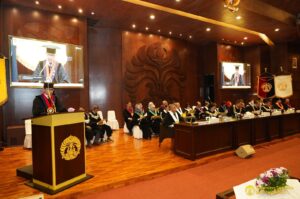Prof. Dr. Teguh Kurniawan, S.Sos., M.Sc., was inaugurated as a professor in the field of Public Governance, Faculty of Administrative Sciences (FIA) Universitas Indonesia (UI) yesterday (6/9). The inauguration procession was led directly by UI Rector Prof. Ari Kuncoro, S.E., M.A., Ph.D., at the Convention Center, UI Depok Campus. On this occasion, Prof. Teguh delivered his inauguration speech entitled “Public Governance Challenges in the Era of Disruption: Strengthening the Role of Ethics in Policy Making”.

Currently, digital technology is developing very rapidly, such as the internet, cloud computing, artificial intelligence, and other technological developments. However, these technological developments also trigger disruptions and change the way business, industry, and society operate. This brings changes that impact on various aspects, one of which is governance. Prof. Teguh conveyed, if the government, together with the public and the business sector, are not responsive enough to see the opportunities and threats of technological evolution, then the country will not be free from conditions of increased unemployment and social dislocation, representative democracy will have difficulty realizing the citizens’ aspiration, and citizens’ expectations are neglected.
Furthermore, disruption occurs not only because of technological developments, but also due to changes in social, political, and environmental aspects. In the social aspect, for example, there are changes in society’s values and preferences along with the emergence of a new generation with different views and habits. This will lead to demands for governance processes and public policy making to be in line with this situation. Likewise, climate change and the environmental crisis require the public sector to be able to adapt in implementing governance and the process of making public policies.
At this point, ethics plays an important role in the process of making public policies in the era of disruption, so that it can ensure that the policies taken still uphold moral values, justice, and the interests of society. Disruption, whether caused by technological advances or other causes, has created complex challenges that require in-depth ethical considerations in implementing governance and making public policies.
In the Indonesian context, throughout his experience as a lecturer and implementing the Three Principles of Higher Education, Prof. Teguh revealed that there are three important things that form the basis for making policies that are in favor of the great interests of this country in the long term. First, the political process of making public policies must not depart from the big goals of a policy being drawn up, even if this policy is more or less not in line with the interests of the groups that happen to be policy influencers. It is inappropriate for a country to ignore the country’s wider interests just to smooth out the interests of certain groups. Thus, the process of formulating policies at the ethical political level refers to the great interests of the state.
Second, policy makers must stand on correct, proportional, and multidisciplinary evidence. Thus, all information, data, and materials for policy formulation are taken into consideration and no information, no matter how small, is ignored. The era of disruption is characterized by open access to the widest possible data and information that we know as big data. Third, policies are not designed without being implemented. The biggest problem in the public governance process lies in the emergence of large discrepancies between policy objectives on paper and those that occur in the field. Therefore, ethics once again becomes a moral compass to ensure there is no policy discrepancy.
“None of us does not play a role in the process of public governance either directly or indirectly. So far, maybe we have only seen a big role only in policy makers. However, the actual success of a public governance process requires not only policy makers but also our role as policy subjects. Therefore, ethics does not only demand policy makers, but also all of us are required to be ethical,” said Prof. firm.
During the inauguration, which was broadcasted virtually via the Universitas Indonesia YouTube channel and UI TV, also present the Head of the Commodity Futures Trading Supervisory Agency, Ministry of Trade (Kemendag) Dr. Didid Noordiatmoko, M.M.; Commissioner of the Supervision Working Group for Filling High Leadership Positions in Region I, State Civil Service Commission Dr. Rudiarto Sumarwono; Main Secretary, Pancasila Ideology Development Agency (BPIP) Dr. Adhianti, S.IP., M.Si.; Deputy President Commissioner of Bank Mandiri Tbk Drs. Andrinof Achir Chaniago, M.Si.; Deputy for Bureaucratic Reform, Apparatus Accountability and Supervision, Ministry of Administrative Reform and Bureaucratic Reform Prof. Dr. Erwan Agus Purwanto, M.Si.; Deputy for Economic Policy Support and Increasing Competitiveness, Secretariat of the Vice President of the Republic of Indonesia Guntur Iman Nefianto, S.E., S.H., M.H. ; and Director General of Environmental and Forestry Law Enforcement, Ministry of Environment and Forestry Dr. Rasio Ridho Sani, M.Com., M.P.M.
Prof. Teguh successfully completed his Bachelor of Administration at UI in 2000. Then, in 2003 he continued his education and earned a Master of Science degree in Urban Environmental Management, Wageningen University & Institute for Housing and Urban Development Studies, the Netherlands. Then, he returned to UI to carry out his doctoral education and received a Doctor of Administrative Science degree in 2017. Some of his scientific works are indexed by Scopus, including the title Assessing the national complaint handling system in Indonesia (LAPOR!) using the design-reality gap model (2023) ); Discretion as a Factor in Corruption: A Case from Indonesia (2022); and Collaborative governance in managing plastic waste in Bali (2021).
